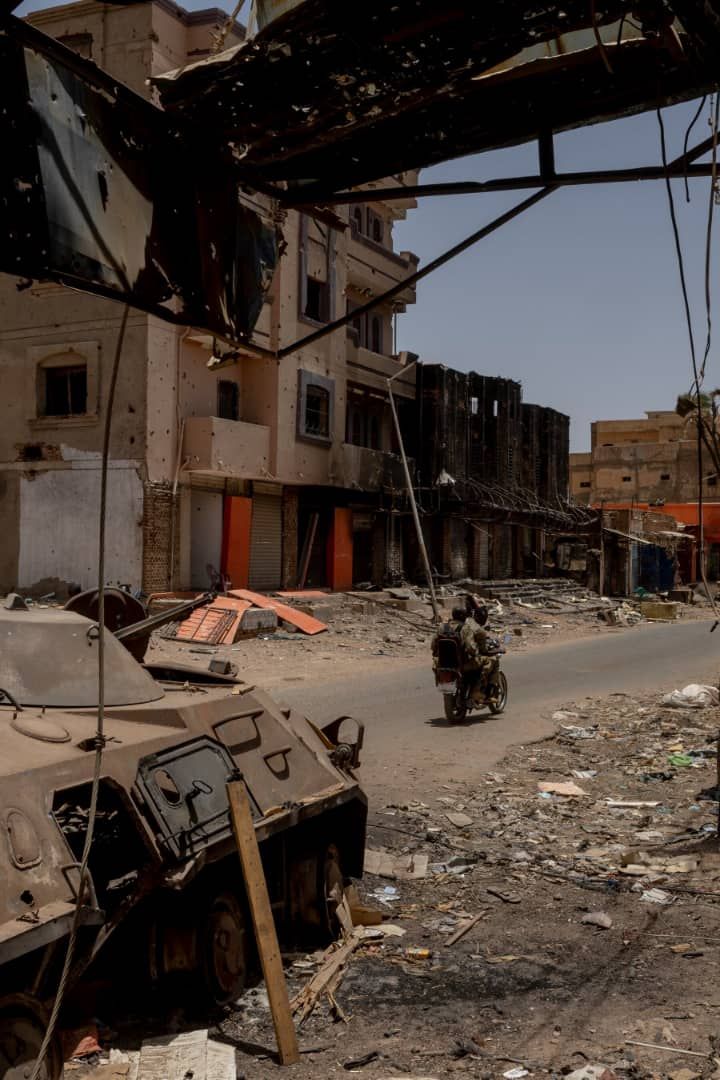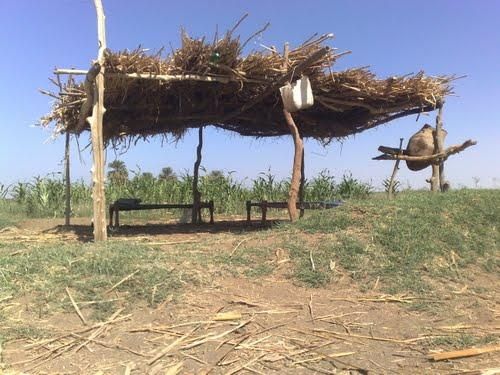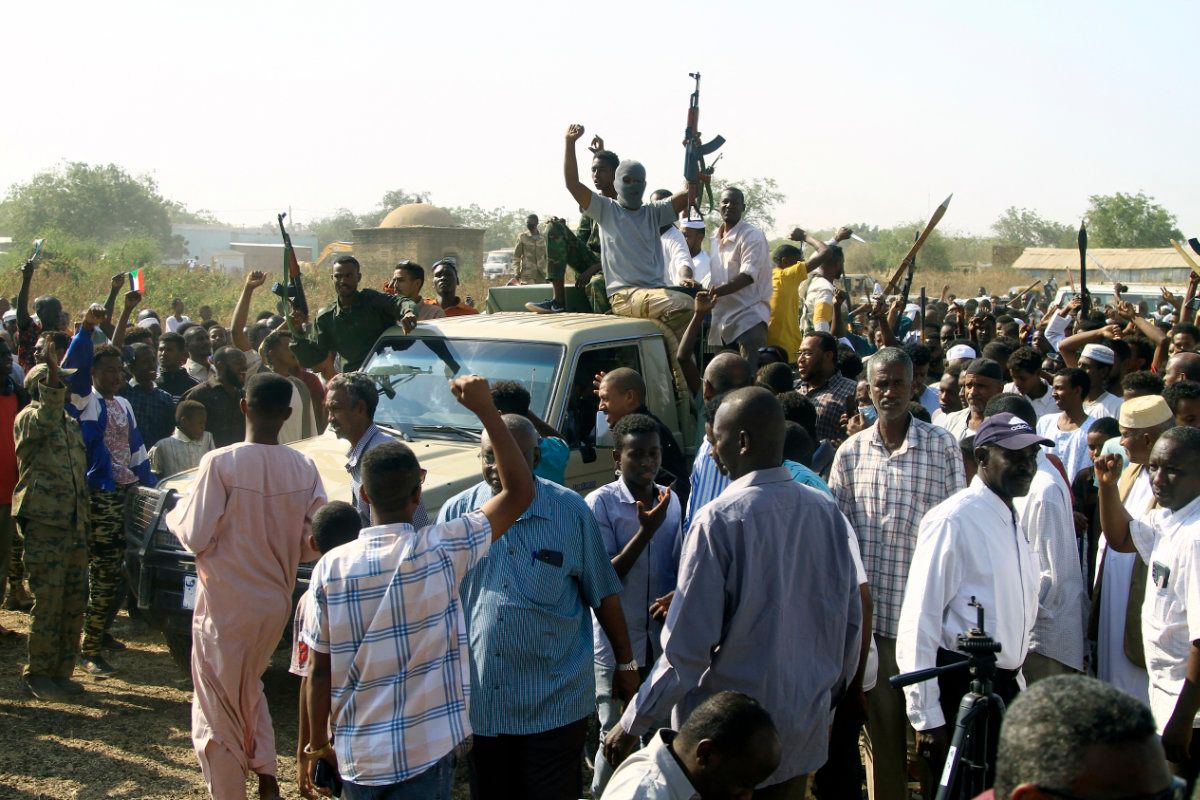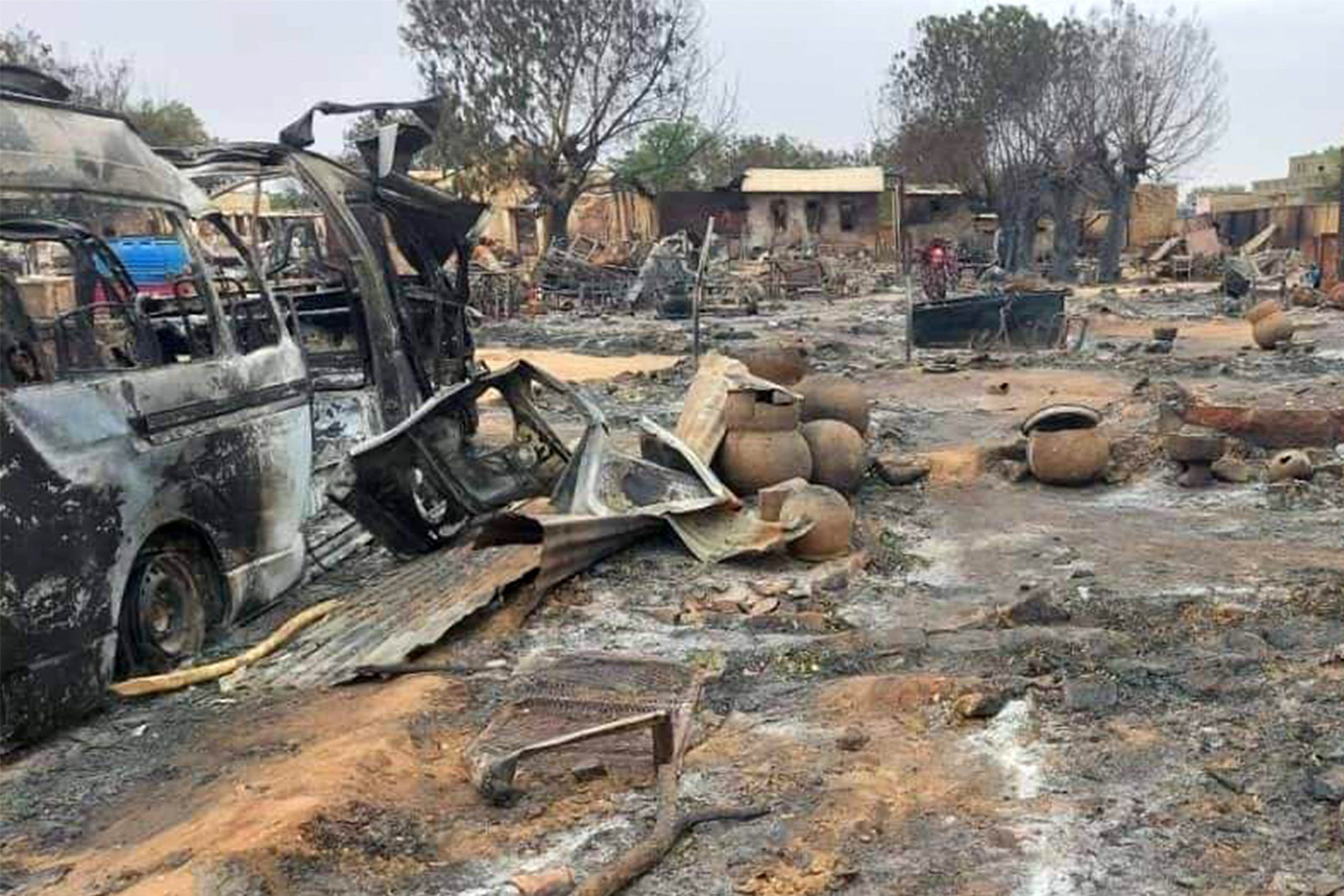In a seemingly calm evening in Omdurman, I was riding a bus that was moving north and parallel to an area called block 54 (nicknamed El Khodair); that evening was shelling-free and you can hear neither heavy artillery from the military barracks of Karrari nor aircrafts patrolling the horizons of the old city.
Glancing out of the bus window, you can notice the street vendors, a few kids playing in-front of their houses, soldiers walking and driving motor bikes, evacuating people riding horse chariots and carrying on them their house furniture. These have been the every-day scenes in Omdurman but what caught my attention that evening was the rawakeeb (these are small huts which are constructed from local materials, they stand on four wooden columns and are normally used as coffee shops).

Sudanese army soldiers ride a motorcycle. Source: The New York Times
The rawakeeb themselves exhibit a rather innocent appearance; they look like every other coffee shop owned by a tea lady who wants to make ends meet. However, it turned out that some of the most obscene business dealings take place inside these small establishments. It is not narcotics or gambling or some other illicit activities that are done over there. This is something more grave and more serious, as it represents perhaps the ugliest manifestation of the ongoing war.
A few days ago I had a conversation with a soldier who used to frequent the area; I asked him about the place and why there are lots of women in the evenings. “This is a place in which you can find any type you want,” he said, “lots of women, young, old, married, divorced, you name it.” He meant that this is officially—or unofficially—a Red Light District.

The shape of the Sudanese Rakooba. Source: areq.net
Historically, sex-work has been highly prevalent during wars. The International Encyclopedia of the First World War documented the challenges that faced the military leadership of both sides on the Western Front in dealing with sex-work, which, at the time, was getting out of control. Fearing an imminent spread of venereal diseases between military personnel, Great Britain, France, Germany, and Russia tried to make sex-work a little bit safer by creating their own medically-regulated brothels.
Nevertheless, there was still a parallel market for clandestine sex-work, the workforce of which consisted of women who were “young, often poor, unemployed, or working in low-wage positions,” according to an article by Journey Steward from Northern Illinois University. Most of these women “plied their trade on the streets, in bars, parks, pubs, nightclubs, and hotels of Austria-Hungary’s cities, ports, and garrison towns, and even some of its smaller municipalities.”
It is very concerning when you think of what is going on in Omdurman, as the spread of venereal diseases is more than probable; wearing protection and following medical procedures is out of the question for these thousands of troops driving SUZUKI GN125 with women on the back of the motorcycle.
Wars bring with them, in addition to the horrors and terrors, massive economic shifts that necessarily drive social change. According to Business Unusual 2023 Transition Report, which is published by European bank of Reconstruction and Development: “On average, GDP per capita drops by 9 per cent relative to its pre-war level before starting to recover, while the median decline is 3 percent. The 20 sharpest contractions in the dataset see GDP per capita drop by between 40 and 70 per cent relative to the pre-war level at some point during the war.”
The report analyzed the findings of years of data gathered by leading international institutions such as the IMF. Although the analysis is based on the data of more than 700 wars within and between many states, the authors noted that Sudan is one of the few exception; for while the average duration of war in each country under study lasted for 2.4 years, Sudan has a war duration of more than 25 years by the time this study came out. The war of April 15th is one the most devastating wars in the history of the country, and it was not even included.
On the other hand, young men, whether from rural communities or under-served classes in urban settings, have found themselves in a very complicated position. Some have joined the army as mobilized reservists; while others joined the RSF for many reasons, most notably financial. This militarization of the young generations will have an extremely negative toll on the future of the country.

Supporters and members of the Sudanese armed popular resistance, which backs the army. Source: AFP
“I have enlisted!” exclaimed Mutawakil, an energetic young man whom I’ve known recently. He decided to join the army as a reservist after being jobless for more than six months. “I am traveling tomorrow to start my military training,” he added. Thousands of desperate young men have done the exact same thing for mostly the same reason—economic necessity.
It is not all illicit and doom and gloom, as that is only a tiny segment of what the majority of Sudanese are doing. Most of society has adapted to the challenges of the times with the most remarkable resilience and stoicism. Women and men are providing for their families by selling food—the only in-demand commodity in these times of stagnation. They sell ta’amiya (falafel) in front of their houses, near main streets or in souqs.
Sudanese people have always been patient when you consider the tumultuous socioeconomic history of this country. They would turn the bitterest of circumstances to their favor, grinding on scarce resources and opportunities and delivering more than is expected from any human in such a disquieting environment.

People's livelihood are burned in El Fasher, North Darfur. Source: AFP
I’ve seen people getting married while the cracks of machine guns are distinct in nearby areas! Some people also visit their relatives in other areas, bearing the dangers of checkpoints and the sudden and unpredictable escalation of fighting in many places. One might argue that such behaviors are rash and irresponsible in such exceptional times, and that is partly true. However, isn’t it rash and irresponsible to wage a deathly war so suddenly among people with such a boundless, incandescent love for life?
